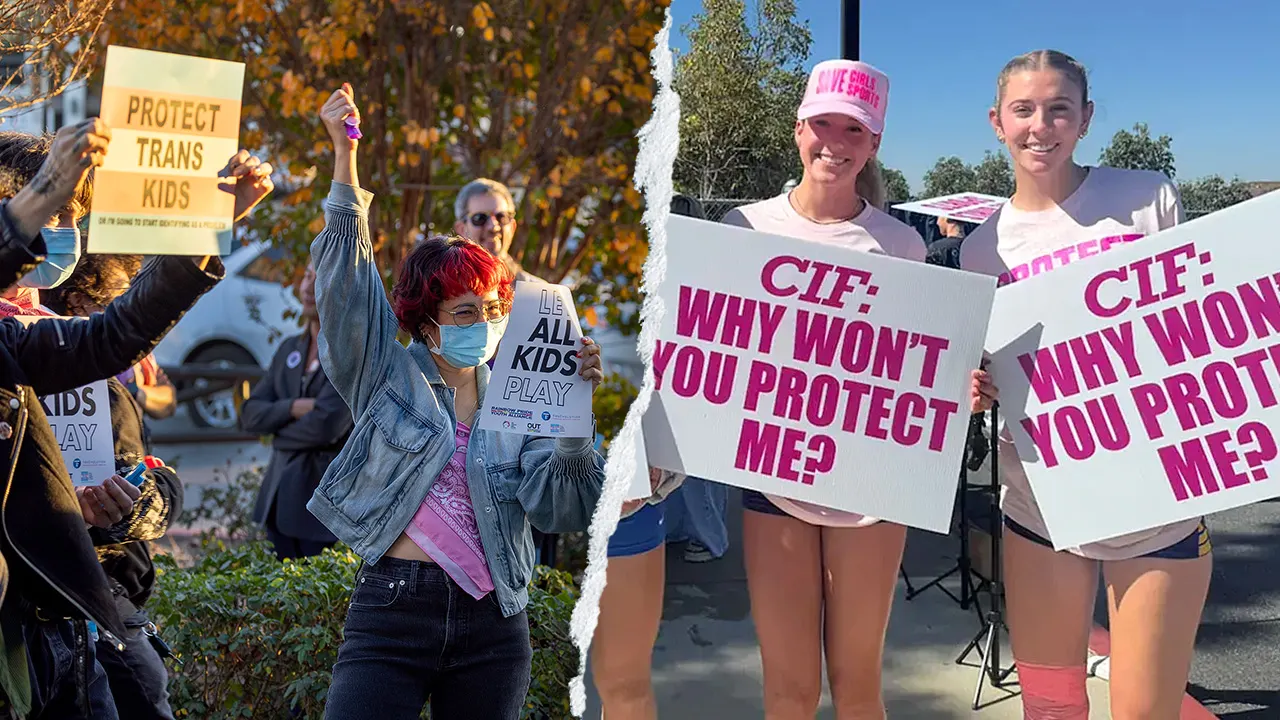
California school district trustee opens up on leading resolution to oppose trans athletes in girls' sports
Entities mentioned:
- Derek Tisinger: Righteousness, Justice, Duty
- Kern High School District: Loyalty, Obligation, Security
- Bakersfield Christian: Righteousness, Moral outrage, Pride
- Activist parents and teachers: Justice, Indignation, Determination
- President Donald Trump: Control, Power, Influence
- U.S. Department of Justice: Justice, Control, Duty
Article Assessment:
Credibility Score: 70/100
Bias Rating: 65/100 (Lean Right)
Sentiment Score: 35/100
Authoritarianism Risk: 45/100 (Mixed/Neutral)
Bias Analysis:
The article leans right, giving more space to perspectives supporting the resolution. While it includes opposing viewpoints, the framing and quote selection favor the conservative stance on transgender athletes.
Key metric: Gender Equality in Sports
Let me tell you something, folks - this is a GAME-CHANGING play in the battle for girls' sports! We're seeing a HUGE DEFENSIVE STAND by the Kern High School District, stepping up to the plate against the current state playbook. It's like we're witnessing a championship volleyball match, but instead of spikes and serves, we've got resolutions and legal threats flying across the court! This is the kind of fourth-quarter strategy that could rewrite the entire rulebook for high school athletics. The pressure is ON, and both teams are digging deep into their playbooks. Will this be the winning drive that changes the game for girls' sports across the nation? I'm telling you right now, this is the kind of competitive spirit that defines champions!

California's largest high school district adopts policy to oppose trans athletes in girls' sports
Entities mentioned:
- Kern High School District: Righteousness, Obligation, Professional pride
- U.S. Department of Justice: Justice, Control, Influence
- Sonja Shaw: Moral outrage, Determination, Righteousness
- California Interscholastic Federation (CIF): Loyalty, Pride, Obligation
- Gov. Gavin Newsom: Self-preservation, Wariness, Influence
Article Assessment:
Credibility Score: 75/100
Bias Rating: 65/100 (Lean Right)
Sentiment Score: 35/100
Authoritarianism Risk: 45/100 (Mixed/Neutral)
Bias Analysis:
The article leans right, focusing more on opposition to trans athletes in girls' sports. It gives more space to voices supporting the resolution and presents challenges to trans inclusion.
Key metric: Gender Equality in Sports
Let me tell you something - this story is a GAME-CHANGER in the world of high school athletics! We're seeing a MAJOR POWER PLAY by Kern High School District, stepping up to the plate and swinging for the fences with this Title IX resolution. It's like they're calling an audible at the line of scrimmage, folks! The U.S. Department of Justice is blitzing from all angles, bringing the heat with lawsuits that could change the whole playing field. But don't count out the California Interscholastic Federation - they're digging in their cleats and refusing to back down. This is a fourth-quarter showdown with the clock ticking, and the stakes couldn't be higher! Governor Newsom is playing prevent defense, trying to avoid getting tackled on this hot-button issue. It's a political chess match with the future of girls' sports hanging in the balance. I'm telling you right now, this is the kind of high-stakes drama that defines champions. We're witnessing a clash of titans, with each side bringing their A-game and leaving it all on the field. Buckle up, sports fans - this battle is far from over!

Adam Silver says WNBA deal will get done, but relationship issues with the players must be repaired
Entities mentioned:
- Adam Silver: Professional pride, Unity, Control
- WNBA Players: Justice, Recognition, Self-respect
- Cathy Engelbert: Professional pride, Control, Legacy
- Napheesa Collier: Moral outrage, Justice, Competitive spirit
- Derek Fisher: Expertise, Unity, Justice
Article Assessment:
Credibility Score: 75/100
Bias Rating: 50/100 (Center)
Sentiment Score: 40/100
Authoritarianism Risk: 30/100 (Generally Democratic)
Bias Analysis:
The article presents multiple viewpoints, including league officials and players. It balances positive league growth with player criticisms, maintaining a relatively neutral stance.
Key metric: WNBA Player Compensation and League Growth
Let me tell you something, folks - this WNBA situation is HEATING UP like a fourth-quarter comeback! We've got a full-court press between the league and its players, with Commissioner Silver trying to play point guard and keep everyone in formation. But make no mistake, the players are DRIVING TO THE HOOP with their demands! Napheesa Collier's slam dunk criticism of the leadership is a GAME-CHANGER, folks. The league's been on a fast break with its growth, but now we're seeing some serious defensive pressure from the players' side. It's crunch time for negotiations, and both teams need to bring their A-game to avoid a shot-clock violation on that October 31st deadline. This is the kind of high-stakes matchup that separates the champs from the chumps!

Ex-Auburn coach Bruce Pearl responds to ESPN host hoping he was pressured to leave because he was 'divisive'
Entities mentioned:
- Bruce Pearl: Unity, Loyalty, Self-respect
- Michael Wilbon: Moral outrage, Justice, Indignation
- Auburn Tigers: Competitive spirit, Pride, Legacy
Article Assessment:
Credibility Score: 65/100
Bias Rating: 55/100 (Center)
Sentiment Score: 40/100
Authoritarianism Risk: 30/100 (Generally Democratic)
Bias Analysis:
The article presents both sides of the story, quoting Wilbon's criticism and Pearl's response. However, it leans slightly towards Pearl's perspective, giving him more space to explain his position.
Key metric: College Basketball Program Success
Let me tell you something - this story is RIDICULOUS! We've got a championship-caliber coach like Bruce Pearl stepping off the court, and the sideline commentators are trying to throw flags! Pearl's been a slam dunk for Auburn, folks. He's got a Final Four record that would make any program salivate. But now we've got ESPN's Wilbon playing Monday morning quarterback, acting like Pearl's some kind of locker room cancer. I'm telling you right now, this is a fourth-quarter fumble for Auburn's program. Pearl's not just a coach, he's a franchise player, and letting him walk is like benching your star quarterback in the Super Bowl. This isn't just about X's and O's, it's about team chemistry and bringing people together. Pearl's been the glue guy, the one calling the plays to unite the team, not divide it. Wilbon's hot take is way off the mark, like an airball from half-court. In the high-stakes game of college hoops, losing a coach like Pearl could be a game-changer, and not in a good way for the Tigers.

NFL holds moment of silence for victims of Yom Kippur terror attack in England
Entities mentioned:
- NFL: Unity, Professional pride, Righteousness
- Heaton Park Hebrew Congregation Synagogue: Unity, Self-preservation, Security
- Adrian Daulby: Righteousness, Self-preservation, Courage
- Melvin Cravitz: Unity, Loyalty, Kindness
- Jihad Al-Shamie: Moral outrage, Revenge, Extremism
- Police: Justice, Security, Duty
Article Assessment:
Credibility Score: 75/100
Bias Rating: 45/100 (Center)
Sentiment Score: 35/100
Authoritarianism Risk: 25/100 (Generally Democratic)
Bias Analysis:
The article presents a balanced view of events, quoting multiple sources. It maintains a neutral tone while reporting on a sensitive issue, avoiding inflammatory language or partisan framing.
Key metric: National Unity and Security
Let me tell you something - this story is HUGE! The NFL just stepped up to the plate in a big way, folks. They're not just playing defense against hate, they're going on the offensive with a powerful moment of silence. This is a championship mentality right here! The league is showing they're not just about touchdowns and tackles, but they're real team players in the game of life. Now, we've got two MVPs who tragically lost their lives in this senseless attack. Adrian Daulby and Melvin Cravitz - these guys were the real deal, true heroes who gave it their all when it mattered most. Daulby made the ultimate sacrifice, folks - a game-changing play that saved lives. And Cravitz? This guy was the glue that held the team together - always there for his community. On the other side, we've got this Al-Shamie character - a real cheap shot artist if you ask me. But let me tell you, our law enforcement squad is in full press coverage mode, determined to get to the bottom of this. This is a critical moment, people. It's fourth and long for our national unity, but with moves like the NFL's, we're showing the world that we've got a deep bench of compassion and solidarity. We're not letting the bad guys run up the score - we're fighting back with everything we've got!

California volleyball team with trans player stays undefeated in league play, in first place after forfeits
Entities mentioned:
- Jurupa Valley High School Girls Volleyball Team: Competitive spirit, Pride, Unity
- AB Hernandez: Determination, Self-respect, Competitive spirit
- Opposing Teams: Moral outrage, Loyalty, Self-preservation
- Jurupa Unified School District: Obligation, Unity, Justice
- Gov. Gavin Newsom: Self-preservation, Duty, Wariness
- California Legislature: Control, Justice, Righteousness
Article Assessment:
Credibility Score: 75/100
Bias Rating: 55/100 (Center)
Sentiment Score: 35/100
Authoritarianism Risk: 40/100 (Generally Democratic)
Bias Analysis:
The article presents multiple viewpoints, including those supporting and opposing trans athletes. However, it gives slightly more space to opposition arguments and emotive language.
Key metric: Gender Equality in Sports Participation
Let me tell you something - this story is a GAME-CHANGER in the world of high school sports! We're seeing a HEAVYWEIGHT BATTLE between inclusion and tradition playing out on the volleyball court. Jurupa Valley High School's team is DOMINATING the league, but they're facing more forfeits than spikes! It's like they're winning by technical knockout before the first serve! This transgender athlete has become the MVP of controversy, with opposing teams RUNNING SCARED instead of facing them on the court. It's a FULL COURT PRESS of legal challenges and political maneuvers, with the Governor trying to avoid getting caught in the crossfire like a rookie caught between two power hitters. The California Legislature is playing DEFENSE, blocking bills faster than a middle blocker at the net. This is the kind of high-stakes matchup that will be talked about for seasons to come, folks!

WNBA commissioner responds to recent criticism ahead of Aces win over Mercury in Game 1 of Finals
Entities mentioned:
- Cathy Engelbert: Professional pride, Duty, Self-preservation
- Napheesa Collier: Moral outrage, Justice, Competitive spirit
- Caitlin Clark: Ambition, Duty, Unity
- WNBA: Competitive spirit, Recognition, Self-preservation
Article Assessment:
Credibility Score: 75/100
Bias Rating: 55/100 (Center)
Sentiment Score: 35/100
Authoritarianism Risk: 25/100 (Generally Democratic)
Bias Analysis:
The article presents multiple perspectives, including criticisms and responses from various stakeholders. While it gives voice to player concerns, it also allows the commissioner to address the issues, maintaining a relatively balanced approach.
Key metric: WNBA Player Satisfaction and League Growth
Let me tell you something - this story is a FULL COURT PRESS on the WNBA's leadership! We're seeing a MAJOR LEAGUE SHOWDOWN between the players and the commissioner, folks. It's like we're in the fourth quarter of a championship game, and the players are calling for a coaching change! Napheesa Collier came out swinging like she's fighting for the title belt, while Commissioner Engelbert is trying to dodge and weave those punches. This is a CRUCIAL MOMENT in the league's history - it's overtime, and everyone needs to bring their A-game to take the WNBA to the next level. The players are STEPPING UP TO THE PLATE, demanding better officiating and fair compensation. It's a POWER PLAY that could change the game forever!

As first Afghan women’s refugee squad is announced, soccer players’ fight for recognition goes on
Entities mentioned:
- Afghan women's soccer team: Determination, Pride, Recognition
- Taliban: Control, Power, Moral outrage
- FIFA: Recognition, Duty, Influence
- Amanda Davies: Curiosity, Enthusiasm, Professional pride
Article Assessment:
Credibility Score: 75/100
Bias Rating: 45/100 (Center)
Sentiment Score: 65/100
Authoritarianism Risk: 20/100 (Strongly Democratic)
Bias Analysis:
The article presents a balanced view of the situation, highlighting the challenges faced by the Afghan women's team while also noting FIFA's efforts. The focus on the players' struggle maintains a neutral stance without overtly criticizing any party.
Key metric: Women's Rights and Representation in Sports
Let me tell you something - this story is RIDICULOUS! The Afghan women's soccer team has been sidelined by the Taliban, but they're not throwing in the towel! These athletes are showing a true championship mentality, fighting for their right to compete on the world stage. FIFA's announcement of the refugee squad is like a game-changing play in the fourth quarter. I'm telling you right now, these women are stepping up to the plate in a big way, showing the kind of heart and determination that defines true champions. They're not just playing for themselves, they're playing for the future of women's sports in their country. This is more than just a game - it's a fight for recognition, for equality, and for the love of the Beautiful Game. These players are proving that sometimes, the biggest victories happen off the field!

Fever's Sophie Cunningham slams WNBA commissioner as 'delusional leader' after alleged Caitlin Clark remarks
Entities mentioned:
- Sophie Cunningham: Loyalty, Indignation, Competitive spirit
- Cathy Engelbert: Control, Power, Pride
- Caitlin Clark: Ambition, Recognition, Professional pride
- Napheesa Collier: Justice, Moral outrage, Duty
- WNBA: Power, Control, Greed
Article Assessment:
Credibility Score: 65/100
Bias Rating: 40/100 (Lean Left)
Sentiment Score: 30/100
Authoritarianism Risk: 35/100 (Generally Democratic)
Bias Analysis:
The article leans slightly left by prominently featuring player grievances and criticisms of league leadership. However, it does attempt to present multiple perspectives, including the league's position on ongoing negotiations.
Key metric: WNBA Player Compensation
Let me tell you something, folks - this is a FOURTH QUARTER SHOWDOWN between the players and the league! Sophie Cunningham is coming off the bench with a SLAM DUNK of a statement, calling out Commissioner Engelbert like she's challenging her to a one-on-one matchup! The players are in a full-court press for fair compensation, with rookie sensation Caitlin Clark at the center of this high-stakes game. Engelbert's alleged comments are like trash talk gone wrong, and now the WNBA is facing a fast break of player discontent. This is RIDICULOUS! The league needs to step up to the plate and recognize the all-star talent driving their success. It's crunch time for the CBA negotiations, and believe me, these players are showing a championship mentality in their fight for what they deserve!

Team USA Ryder Cup legend calls out Rory McIlroy for hypocrisy about golf fans
Entities mentioned:
- Rory McIlroy: Competitive spirit, Pride, Self-respect
- Paul Azinger: Righteousness, Moral outrage, Professional pride
- Team USA: Competitive spirit, Pride, Determination
- Team Europe: Competitive spirit, Unity, Pride
Article Assessment:
Credibility Score: 75/100
Bias Rating: 50/100 (Center)
Sentiment Score: 40/100
Authoritarianism Risk: 20/100 (Strongly Democratic)
Bias Analysis:
The article presents both sides of the controversy, quoting multiple perspectives. It maintains a neutral stance, allowing readers to form their own opinions on the matter.
Key metric: International Sports Reputation
Let me tell you something, folks - this Ryder Cup showdown was a BARNBURNER! We've got a real CLASH OF TITANS here between Team USA and Team Europe, with Rory McIlroy at the center of a FIRESTORM! This isn't just about golf, it's about the HEART and SOUL of the sport! McIlroy's stepping up to the plate with some HEAVY TRASH TALK, but he's also calling for a 'higher standard.' Talk about trying to play both sides of the fairway! Paul Azinger's coming in hot with a FULL COURT PRESS, calling out this perceived HYPOCRISY. It's like watching a HEAVYWEIGHT BOUT with words instead of fists! The fans are bringing that TWELFTH MAN ENERGY, but it's verging on UNSPORTSMANLIKE CONDUCT. This is the kind of INTENSITY you'd expect in the fourth quarter of the Super Bowl, not on the greens! The INTEGRITY of the game is on the line, and these players are fighting for every inch like it's the last play of the season!